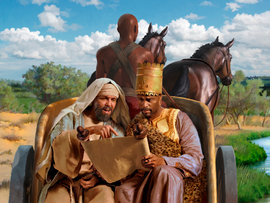There is one passage in the book of Acts that initially seems to challenge this idea that baptisms were intended to be a public demonstration of a life-changing decision which would cause others to ask the baptized person about what they had changed. This is the passage about the Ethiopian Eunuch in Acts 8:26-40.

The Baptism of the Ethiopian Eunuch
According to Acts 8:27, this Ethiopian was a Eunuch of great authority under Candace, the Queen of Ethiopia. He had charge over the entire royal treasury, which indicates he was a high-ranking public official in the royal courts of Ethiopia.
Philip overhears him reading from Isaiah and offers to explain the Scripture. After doing so, the man believes in Jesus, and Philip takes him down to some nearby water baptize him. Note that if this man was a proselyte to Judaism, as the text hints that he was (cf. 8:27), he would have already been baptized into Judaism. Now he was getting baptized again, this time into a full identification with Jesus Christ.
How was this a Public Demonstration?
But the question is this: How could this have been a public identification with Jesus if nobody witnessed the baptism except for Philip? The way this passage is usually presented in sermons and drawings is that Philip and the Eunuch are all alone on a deserted road, and the two of them go down into the water to be baptized. If this Ethiopian Eunuch was all alone and far away from home, then nobody would have seen or known what he did on this deserted road in Israel, and therefore, his baptism could not have been a public testimony to anyone.
 And yet it is highly unlikely that this Eunuch was alone.
And yet it is highly unlikely that this Eunuch was alone.
First of all, he was a powerful public official in Ethiopia, overseeing the entire treasury. It is quite certain that he was traveling with an entire retinue to servants and body guards.
There is even a hint of this in the text where we are told that he was sitting in the chariot reading Isaiah while someone else drove. After all, when he wanted to get baptized, he commanded that the chariot stop (8:38).
Clearly, there were others traveling with the Ethiopian Eunuch who would have seen him get baptized, would have asked him about it on their journey back to Ethiopia, and would have observed his life and actions to see what differences (if any) followed as a result of the Eunuch fully identifying himself with Jesus.
So this baptism also was a public declaration by the Ethiopian Eunuch that he was making a drastic change in his life by dying to his past, and was fully identifying himself with the life and example of Jesus Christ.




Yes, I agree that he was undoubtedly accompanied by at least several people, considering his position. And I do agree that his baptism would have made an impression on those with him, an impression which would have been strengthened if they later observed differences in his life. I do wonder, however, if any of them would have been in a position, since they may all have been of lower status than the eunuch, to discuss the matter with him.
Perhaps this comes back to the central questions of “Should one be baptized for the benefit of onlookers? Should one be baptized because in that moment one identifies with Christ? Is it only in the moment of baptism that one identifies with Christ? Must one be baptized (in some traditional sense, with water)?”
Did Philip baptize the eunuch primarily for the benefit of the onlookers? Is that why we find the story in Acts? If so, why are the onlookers only implied? Or was there more to the eunuch’s baptism than what it might have said to any onlookers?
Sam,
All great questions. And I have no answers.
The placing of this story in Acts is odd to me, and so I either am missing some details about this story, or have misunderstood the thought flow of Acts.
Many assume that this Eunuch was a Gentile, but it is placed in the section about the Gospel going to the “half-breed” Samaritans. The “Gospel to the Gentiles” section does not begin until Acts 10.
So maybe this Eunuch was partly Jewish, and that is why Luke put it here? Some commentators think this is indeed the case.
My underdtanding of this scripture is that the Euncoh was jewish because it says ‘he was in Jerusalem to worship’. Am I wrong in this assuption?
Good answer, Fiona. There is no particular reason to assume he was not Jewish. The speculation that it was in a “section on preaching to the ‘half breeds’ /Samaritans” might be some handy way someone sections off that section of the book, but to assume every incident within a certain part of scripture is there like a Science book identifying the phylum and genus of an animal, that is, that everything mentioned under the Raccoon Family is in the Raccoon Family (the ring-tail cat, kinkajou, coatimundi… three other members of the raccoon family), is an assumption that does not seem to apply to the Bible and how it is written… it is more human, and living, and not sterile, everything in its tight little unmovable section, etc. But sidestepping that, since all contemporary Ethiopian Jews (and many Ethiopian Orthodox and Evangelicals) in Ethiopia trace their lineage to Solomon and the Queen of Sheba, there would have, thus quite likely, been plenty of Ethiopian Jews back then. Personally, whether the Ethiopian was Jewish, half-Jewish, or of another religious faith, the story remains of equal importance…. I bumped into this discussion late, so excuse my ignorance, or if i am being off-topic, like wandering into a room and not really knowing what’s going on. Bottomline, there are thousands and thousands of Ethiopian Jews and they’ve been in Ethiopia for as long as anyone can remember and, in fact, many of them grow up not knowing about the existence of very very light skinned Jews, (such as myself, of the Jews who fled to Northern Europe at the great dispersion after the destruction of the temple, and after thousands of years living in the frigid north, with low levels of sun, and exposure to the sun, our skin slowly became lighter and lighter, hence I am considered “White”, but it simply means my ancestors gravitated northward to the land of little sun, and Ethiopian Jews, and of course South African and West African Jews (identified positively by DNA) have much darker skin, even to that of very very deep velvet Black…) Black is beautiful! White is okay too! But, I don’t see any indication i the above passages that would suggest the Ethiopian Eunuch was not Jewish… though it’s fine with me if he was “half-Jewish”, but the speculation seems very very, well, speculative to me.
Our sermon today was about witnessing and how we do it. What a great example of one of the great ways to witness, by explaining scripture!
Quick question. He was baptized, but there was no account of him joining a church. Am I correct in thinking this eunuch was responsible for evangelizing/church planting in his own country following his conversion? Can we learn this via recorded history?